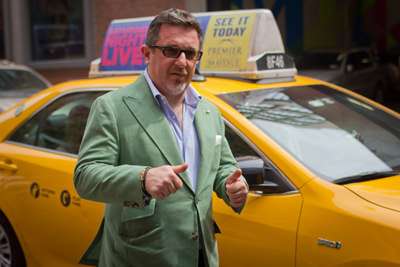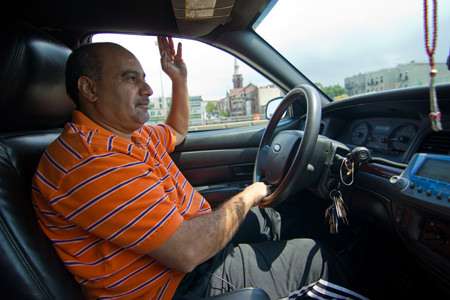When Andrew Murstein hired pop music super star Nicki Minaj to headline his son Matt's Bar Mitzvah, it was an unusually conspicuous flaunting of wealth by one of New York City's leading taxi cab magnates. Newsweek estimates that Minaj might have been paid as much as half a million for the gig, which entailed taking a personal photo with every single boy and girl in attendance.
Andrew Murstein's vast wealth derives from a shrewd decision that his grandpa Leon made 78 years ago. In 1937, New York City issued what ultimately amounted to 13,437 taxi medallions—a special kind of license that conferred the exclusive right to drive a cab in the Big Apple. And Leon Murstein bought one…for $10. And then he bought several hundred more to rent to other drivers.
From 1937 to 2013, the price of each of those medallions climbed from $10 to over a million dollars.
"Ultimately all that value that's built up in the medallions comes from passengers," says Josh Barro, a reporter with The New York Times, who covers the taxi industry. "Fares are higher than they otherwise would be able to be because you have to limit the number of people using these taxis."
Over the years, the city tried periodically to break the medallion cartel to make life easier on the riding public, but to no avail.
And then in May of 2011, Uber began operating in New York City. For the next two and a half years, the taxi industry kept thriving. In November 2013, Medallion Financial, the publicly traded company that's run by Andrew

Murstein, saw its share price hit a thirteen-year high. But as more and more Uber cars took to the streets over the next year and a half, the stock plummeted, ultimately losing about half of its value.
The average number of trips taken in a cab each day has fallen and average farebox revenue has fallen. Taxi garages are jammed with parked cabs because they can't find enough drivers to hire. They'd all rather go work for Uber.
"It really is remarkable how these monopolies that couldn't be broken for decades were broken so quickly," says Barro, "but I think it's because of Uber moving first and saying, 'we're going show people how this thing can be different, and then we'll have the fight over whether we want that different thing or not.'"
The Mursteins diversified out of the medallion market long ago, so they'll end up rich no matter what happens. But Gene Friedman, the city's largest single medallion holder with an estimated 900 to his name, is in deep trouble. He has been sued by the attorney general for ripping off his drivers, flagged as a tax delinquent, and a handful of the taxi garages he owns have filed for bankruptcy protection. In April, Friedman arranged a private meeting of bankers, medallion owners, and elected officials to build support for a city bailout.
"It's a scream by a child for attention," says Freidman.
His idea is that the government should step in and offer a loan guarantee so taxpayers would take the hit if medallion prices were to keep tumbling.
"It is not a real bailout because we're not asking for a penny here," says Freidman.
"The problem is that if the city is guaranteeing a repayment on a medallion loan at a level exceeding the actual market price of a taxi medallion," says Barro, "for millions and possibly billions of dollars in lost value on medallions."
Alaa Khalil is an Egyptian immigrant who spent years driving someone else cab about 90 hours a week. In 1994, he'd finally saved enough to make a down payment on his very own medallion, which cost $178,000.

"Between 1994 and 2013, it was a really good life," says Khalil. "Since Uber invaded our business…it messed up my life."
Khalil says he's now on the verge of financial ruin. He struggles to find customers, and Uber has taken away much of the lucrative airport business. He recently stopped making payments on his credit cards and is struggling to pay the mortgages on both his medallion and on his house in Bay Ridge, Brooklyn.
For Khalil, selling his medallion is no longer an option because there's no liquidity in the market. Nobody even knows what a medallion would sell for at this point because in the past four months there hasn't been a single sale. Just five bank foreclosures.
But Khalil wouldn't be in so much trouble if he hadn't treated his medallion like a cash register over the years. As its price soared, he took vacations, bought an expensive house, and a luxury car. Overall, he borrowed an additional $300,000 against the value of his medallion.
"I refinanced the medallion too many times," says Khalil. "Every time I needed money, I would go and pick up $50,000 or $40,000."
"This is an argument for why you shouldn't create a medallion system," says Barro. "Not every city exposes small investors to making big bets on public policy."
Uber has been unequivocally good for taxi customers--but as even Kahlil acknowledges, it's also been good for many drivers.
"It's a good opportunity for immigrants. My nephew is an Uber, and he makes as much money as I do now. I'm happy for him. But I'm not happy for my family."
7 minutes and 43 seconds.
Shot, edited, written, and narrated by Jim Epstein.
Music: "Lacera per calla" by Sergio (Creative Commons); "Bronco Romp" by Waylon Thornton (Creative Commons).
Scroll down for downloadable versions and subscribe to Reason TV's YouTube Channel to get automatic updates when new material goes live.


Show Comments (0)